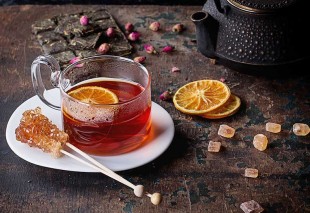

Ingredient Focus: Tea

News
Unilever’s award-winning Dubai tea factory
Unilever’s Lipton Jebel Ali (LJA) factory has been awarded World Class Manufacturing (WCM) status at the Bronze level, becoming the first manufacturing facility in the Middle East to achieve this accolade.
WCM is one of the highest and most rigorous certifications that can be achieved to ensure a stringent commitment to operational efficiency, wastage reduction and creating cost efficient processes by using the latest cutting-edge technology and workforce empowerment. Currently, eight out of Unilever’s 260 factories have achieved WCM status, placing the LJA factory in the top 3% of all Unilever factories globally.
Té Reval wins big at Great Taste awards
The Jafferjee Brothers’ brand, Té Reval, won eight Great Taste awards at the 2017 event organised by the Guild of Fine Foods (UK). Along with its three wins in 2016, these wins raise the company’s tally to 11 Great Taste awards. The recognition received exemplifies the brand’s commitment to offer quality single origin teas flavoured with 100% natural botanicals. Only whole leaf teas produced using artisanal manufacturing processes are used for each blend. All of the Ceylon teas are packed at origin to preserve freshness and to support the livelihoods of local communities. They are also Rainforest Alliance certified.
Products
The White Swan
Double B’s newly-released tea offers sweet, complex flavours. Double B designs signature drinks where it uses tea to complement ingredients, such as strawberry thyme, spiced jasmine tea or pine and mandarin tea. The brand also has a show drink that it calls The White Swan, where tea is pressurised through several vessels with fruit solutions and comes out enriched with flavour.
Pyramid Tea Bag
Té Reval caters to the discerning needs of the food service segment with a wide range of teas and accoutrements. The brand’s latest offering includes an individually packed pyramid tea bag enclosed in a hermetically sealed envelope. This product is ideally suited for executive lounges, breakfast buffets, as a room amenity, and for cafés.
Hario Chaor Tea Maker
This tea pot from Tavola combines function and design. With a large tea strainer and spout, the Chaor tea maker is easy to use. Simply brew tea to desired flavour, then pull up the strainer like a tea bag. To enjoy a second cup as well as the first, simply push the strainer down again. Protected by a stainless steel frame, the Chaor tea maker is also easy to lift with its polypropylene handle.
Top trends
New Techniques
According to Double B founder Anna Tsfasman, people are starting to take tea more seriously, paying more attention to every detail from field to cup. Tsfasman commented: “The second wave of tea is using taste profiles, brewing techniques and scales. We do a lot of experimenting with the compounds of different ingredients that allows us to explore new flavours and to discover these ingredients from a new angle.”
Clean label
The premium tea category continues to grow due to the health properties associated with the drink. Also, tea brands have been obliged to work on green initiatives to simply packaging and to use more renewable resources in production as consumers continue to insist on higher ethical standards from tea brands in sourcing as well as in their community outreach activities. Millennial consumers seek authenticity and brands that act in an ethical manner. Speaking about tea trends, Jafferjee Brothers director Mufaddal Jafferjee said: “New technologies such as block chain will be an interesting way for brands to be more transparent in their supply chain and give added confidence to their customers. Clean label is another important trend which will focus brands to offer more natural tea flavouring albeit at a higher cost.”
Operations
Traceability
Now consumers are looking beyond the cup before making decisions. Double B founder Anna Tsfasman explains: “Everything becomes important. Where and how it was grown to the way in which it was processed. Is it still fresh or an outdated crop? Was it stored according to professional recommendations or just the way one considered convenient? Finally, how was it brewed? Was the temperature and time in harmony with the tea? Was the water-tea ratio accurate? Was the cup suitable? To make all of these things perfect takes a lot of effort, but it is worth it, for sure.”
Cost
A major challenge facing the tea industry is adapting to climate change and irregular rainfall patterns. Jafferjee Brothers director Mufaddal Jafferjee elaborated: “Three of the major black tea producers — Sri Lanka, Kenya and India — have experienced unusually dry weather in the past two years which resulted in a sizeable crop shortages and resultant price escalations. Such events have made it challenging for premium brands to secure consistent quality and control tea costs.”
Sustainability
Bearing the “Made in UAE” label, Unilever’s Lipton Jebel Ali factory is now counted amongst the top tier manufacturing plants in the world and has established the UAE at the forefront of its journey towards sustainable economic growth. The LJA factory is currently the largest tea manufacturing facility in Unilever producing more than 50 million tea cups per day and nearly 20 billion tea cups a year, while exporting to 63 countries including Eastern Europe and Canada, from the UAE.
“Our commitment to sustainability and manufacturing excellence enables us to make tangible contributions towards the UAE Vision 2021 and the next stage in the roadmap as laid out by H.H. Sheikh Mohammed bin Rashid Al Maktoum. Achieving WCM certification places the Lipton Jebel Ali factory in the league of premiere manufacturing facilities in the world and demonstrates our commitment to being at the forefront of sustainable solutions, excellence in manufacturing and innovative technology,” said Unilever MENA, Turkey, Russia, Ukraine and Belarus executive vice president Sanjiv Kakkar.